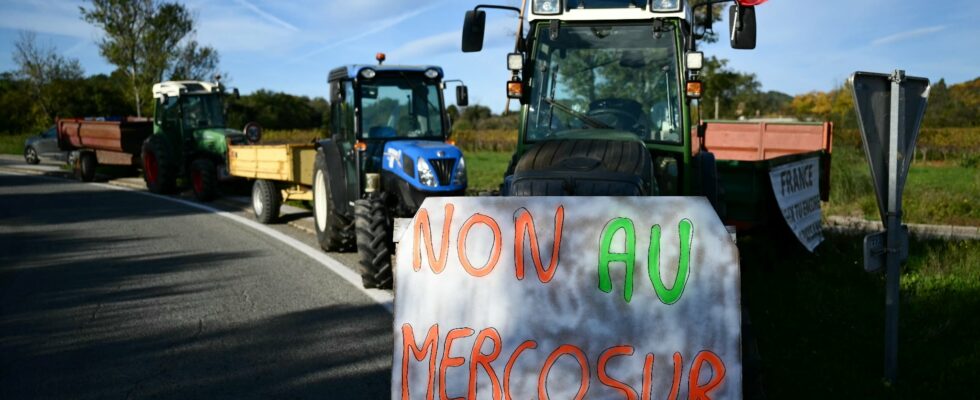“Fires of anger”, roadblocks… Almost a year after a very strong mobilization, French farmers have been taking action again since Monday, November 18, in particular against the proposed free trade agreement with Latin countries. Americans from Mercosur. The foreign press notes that, although France still opposes it, the European Commission’s project is well on its way to being signed.
“France still remembers the last mobilizations of farmers, who marched to Paris and blocked the entrances to the capital,” recalls the Spanish daily El País. The unions then managed to negotiate various promises from the government, such as the removal of the surcharge on fuels or even the “end of the Ecophyto plan, which aimed to reduce the use of pharmaceutical products in agriculture”, recalls the newspaper.
But this time, it is, beyond the poor harvests and difficult working conditions, above all the free trade agreement with the Mercosur countries which crystallizes the anger of the farmers. “Farmers are once again on a war footing,” reports the left-wing Italian daily The Manifesto. “The French are at the head of the European revolt, France being the leading agricultural producer and the leading beneficiary of the CAP.”
Opposition to the “very bad” free trade treaty with Mercosur
“The reason for this is the imminent signing of the EU-Mercosur agricultural free trade treaty, the conclusion of a negotiation begun 25 years ago between Brussels and the Latin American Mercosur countries (Brazil, Argentina, Uruguay, Paraguay, Bolivia). France has in fact been opposed to it for a long time. “France will not sign this treaty as it stands,” Emmanuel Macron reiterated on Sunday from Argentina, recalls El Paíswhere he had just met the Argentine President Javier Milei, repeating that he considers the agreement “very bad” for agriculture.
According to The manifesto“European farmers denounce the lowering of customs duties on beef, poultry, sugar and honey, which would jeopardize EU production in the face of South American giants, led by Brazil and Argentina”, while “environmentalists point out that the agreement does not provide specific protection against deforestation” and an imbalance in environmental and social standards.
Opportunities for the European continent?
“If the Mercosur treaty were to be signed despite everything – which is increasingly likely – an escalation is considered obvious”, analyzes the Frankfurter Allgemeine Zeitung (FAZ). The German newspaper underlines that, if French public opinion and the political class are almost unanimously opposed to this treaty, this is due, among other things, to “traditions and consumption habits”. According to the newspaper, France is a country “where food and cuisine are important cultural assets […] The immense Paris agricultural show, which is held every spring, is the expression of this national pride.” This, added to industrial losses since the 1970s, would explain, according to the German daily, an “anti-free feeling -exchange” well rooted.
However, according to its supporters, the treaty could create economic opportunities in Europe. “Producers of wines, spirits, cheeses and milk powder will have access to a vast market. In addition, France’s appellations of controlled origin would be recognized and respected,” continues the FAZ. “Similarly, industrial sectors such as automobiles, chemicals, luxury goods and cosmetics will be able to increase their exports,” estimates Emmanuel Combe, economist at the Sorbonne, in the pages of the German daily. Especially since “the scale of the increase in imports would be modest: roughly, one steak per European per year and two chicken breast escalopes”, according to The manifesto.
France remains “largely isolated”
For El PaísFrance remains “largely isolated” in Europe on the issue. “If Poland, Austria, the Netherlands and Ireland have also expressed their concerns with regard to the agreement”, their weight would not be enough to prevent a vote in the European Council. Opposite, “Germany, Spain, Italy and Portugal, among others, are pushing for final approval of the agreement in the hope of reviving growth in the continent’s economy”, continues the Spanish newspaper, which recalls that Germany sees in particular “new opportunities for its car manufacturers, because customs duties have until now been particularly high for passenger cars.”
Quoted by the American press agency Associate Pres.sthe Spanish Minister of Agriculture, Luis Planas Puchades, believes that “Mercosur is surrounded by a certain mythology”. “Does the European Union wish, at this moment, to close in on itself? Or is it interested, in the particular geopolitical context that we are experiencing, and especially after the North American elections, by enlargement of our trade agreements with third countries in order to also maintain our economic and commercial influence? I think the answer is very clear,” he said on Sunday.
The European Commission would like to reach a final conclusion, “if not during the G20 in Rio, then at least during the Mercosur summit in Montevideo (Uruguay) on December 5 and 6”, recalls the Italian journalist fromThe manifesto. “It is then that the long process of ratification will begin, Council, European Parliament, even national Parliaments – that is to say with the right of national veto”, unless an accelerated procedure is “adopted by qualified majority, with at least 15 supportive countries representing 65% of the EU population.”
